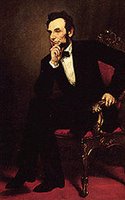
Abraham Lincoln was born in Hardin County, Kentucky on February 12, 1809. Interestingly, Charles Darwin was born on the same day in Shrewsbury, England. While Lincoln spent his life trying to convince people that they were all created equal, Darwin spent his trying to convince them that they weren't created at all.
We all remember the stories of Lincoln's childhood in Kentucky and Indiana, how he was born into the Godly family of Tom Lincoln and Nancy Hanks, how deeply affected he was by the death of his beloved mother when he was ten, and the death of his older sister, Sarah in 1828. We know of his move to Illinois, how he studied on his own, and how he eventually entered into politics. We know how devastated he was by the untimely death of his first true love, Anne Rutledge, and his subsequent marriage to Mary Todd, a woman who always considered him beneath her. Perhaps we even remember that of their four sons only one, Robert, survived his 19th birthday. We may recall the famous debates with Stephen Douglas in the course of which he first broached the subject of slavery. Surely we remember his November 19, 1863 visit to Gettysburg, Pennsylvania. With thousands of white crosses stretching as far as the eye could see President Lincoln gave the most memorable and most often recited speech of his life. Edward Everett, the renowned orator and principal speaker of the day, spoke for two hours. Lincoln spoke for two minutes. After Lincoln had finished, Everett passed him a note of appreciation which read, "I should be glad, if I could flatter myself that I came as near to the central idea of the occasion, in two hours, as you did in two minutes."
We all know, or should know, the Gettysburg Address. It's words and imperatives should be emblazoned on the heart of every American. I reproduce it here because if you don't know it, you should and if you do...it doesn't hurt to be reminded.
"Four score and seven years ago our fathers brought forth on this continent, a new nation, conceived in Liberty, and dedicated to the proposition that all men are created equal.
Now we are engaged in a great civil war, testing whether that nation, or any nation so conceived and so dedicated, can long endure. We are met on a great battle-field of that war. We have come to dedicate a portion of that field, as a final resting place for those who here gave their lives that that nation might live. It is altogether fitting and proper that we should do this.
But, in a larger sense, we can not dedicate -- we can not consecrate -- we can not hallow -- this ground. The brave men, living and dead, who struggled here, have consecrated it, far above our poor power to add or detract. The world will little note, nor long remember what we say here, but it can never forget what they did here. It is for us the living, rather, to be dedicated here to the unfinished work which they who fought here have thus far so nobly advanced. It is rather for us to be here dedicated to the great task remaining before us -- that from these honored dead we take increased devotion to that cause for which they gave the last full measure of devotion -- that we here highly resolve that these dead shall not have died in vain -- that this nation, under God, shall have a new birth of freedom -- and that government of the people, by the people, for the people, shall not perish from the earth."
On November 10, 1977, in a speech at Hillsdale College in Michigan, then President Ronald Reagan remarked, "Freedom is ... never more than one generation away from extinction." If the final words of the Gettysburg Address are not part of your daily life, you are living on borrowed time paid for by others. Freedom isn't just a word; it's a fulltime job.
Nuda Veritas
No comments:
Post a Comment